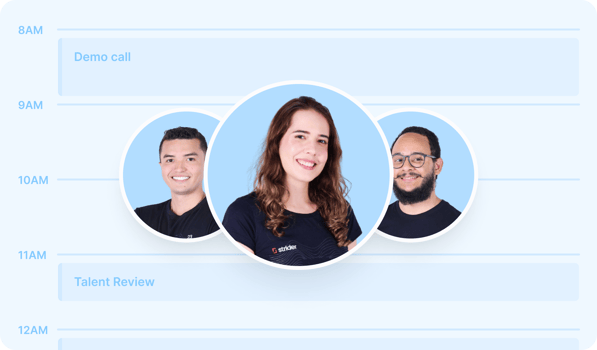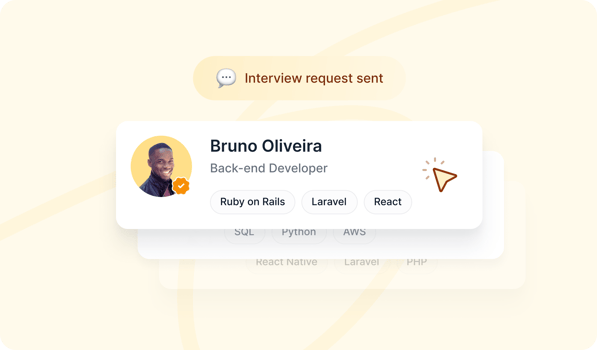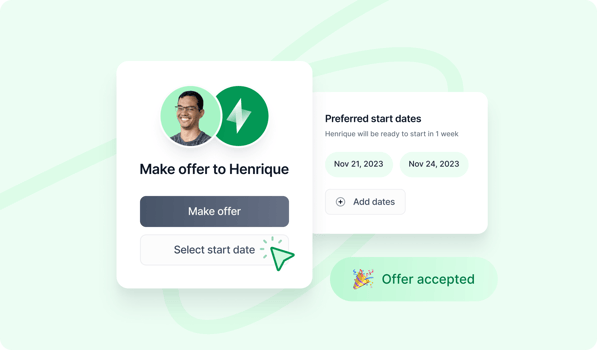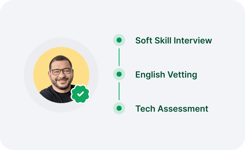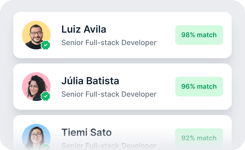Hire Remote Ethereum Developers
The rise of Ethereum blockchain technology has created a high demand for skilled Ethereum developers. The Ethereum blockchain technology has created many opportunities for businesses to build decentralized applications and smart contracts. Hiring Ethereum developers can be challenging and time-consuming, especially if you are unfamiliar with the technology.
Hiring the right Ethereum developer can be a critical factor in the success of your business. You can employ Ethereum developers to help you create smart contracts and decentralized applications that run unsupervised business transactions. Whether looking for a full-stack developer or a specialist Ethereum engineer, finding the right developer is essential for your project's successful implementation.
In this guide, we will cover everything you need to know about hiring Ethereum developers, some questions to ask during an interview, and the common questions about the hiring process.
What to look for when hiring Ethereum Developers
Technical Skills
When hiring the best Ethereum developers, looking for candidates with strong technical skills is essential. Ethereum developers should strongly understand blockchain technology and the Ethereum Virtual Machine (EVM). Skilled Ethereum software developers should deeply understand computer science principles and programming languages such as Solidity, JavaScript, and Python.
Moreover, skilled Ethereum developers should be familiar with developing smart contracts and decentralized applications (DApps) on the Ethereum blockchain platform. They should also have experience deploying smart contracts, performing smart contract audits, and working with Ethereum wallets. Furthermore, having experience with legacy systems and integrating blockchain architecture into existing systems can be advantageous for an Ethereum developer.
Communication Skills
Good communication skills are crucial when hiring Ethereum developers. They should be able to explain complex technical concepts clearly and concisely and collaborate effectively with other development team members. Additionally, they should be able to provide strategic advice and recommendations to clients frequently to ensure the successful implementation of Ethereum-based projects. As Ethereum development services are often done remotely, the candidate should be able to communicate effectively through various mediums, including email, chat, and video conferencing.
Blockchain Architecture
An experienced Ethereum developer should have in-depth knowledge of blockchain architecture, including its security mechanisms, consensus algorithms, and data structures. They should also have a strong understanding of legacy systems and be able to integrate them with the Ethereum network to provide cost-effective solutions.
The candidate should have experience using various tech stacks and tools for Ethereum development, such as Truffle, Ganache, and Remix, and should be able to recommend the best tools for the project. Additionally, they should be familiar with the Ethereum Virtual Machine (EVM) and be able to develop smart contract apps that run unsupervised business transactions on the Ethereum network.
Moreover, experienced blockchain developers should have expertise in deploying smart contracts, conducting smart contract audits, and integrating blockchain technology into existing systems. They should also be able to provide strategic advice and collaborate with clients to deliver cost-effective solutions. In addition to technical skills, communication skills are crucial for successfully implementing blockchain technologies. The development team should be able to provide on-time project delivery and run unsupervised business transactions while ensuring business success.
Top 5 Ethereum Developer Interview Questions
As someone looking to hire skilled Ethereum developers, it's important to ask the right questions that can help you identify the most suitable candidates. In this article, we'll discuss the top 5 Ethereum developer interview questions you should consider asking during your hiring process.
What is Geth's fast sync?
One of the critical questions that you can ask during an Ethereum developer interview is about Geth's fast sync. Geth is a widespread client implementation of the Ethereum blockchain, allowing you to interact with the Ethereum network. Geth's fast sync feature helps to speed up the synchronization process when a new node is added to the network. It does this by only downloading the most current state of the blockchain instead of downloading the entire history of the blockchain.
A possible answer to this question can give you an idea of the candidate's knowledge of Geth and how it works. Additionally, their understanding of blockchain synchronization and network optimization will be revealed.
What are block time and average block size in ethereum?
The block time and average block size are essential concepts in the Ethereum blockchain network, and an understanding of these concepts is crucial for an Ethereum developer. Block time refers to the time to mine a new block in the blockchain network, while block size refers to the data size that can be added to a block.
By asking this question, you can evaluate the candidate's knowledge of Ethereum blockchain technology and their ability to develop efficient smart contracts. A suitable answer to this question will indicate that the candidate understands the importance of optimizing the performance of the Ethereum network.
What is truffle?
Truffle is one of the popular development frameworks Ethereum developers use to build, test, and deploy smart contracts. This framework provides tools for contract compilation, deployment, and testing. Additionally, Truffle has a built-in debugger that can be used to debug smart contract code.
By asking this question, you can assess the candidate's experience and expertise in smart contract development. An ideal answer to this question will demonstrate that the candidate is familiar with the Truffle framework and can use it effectively to develop high-quality smart contracts.
What is the functionality of testnet?
Testnet is a blockchain network that is used for testing and experimentation purposes. This network is similar to the leading Ethereum network but uses a separate blockchain with no real-world value. Developers use Testnet to test their smart contracts and applications before deploying them on the leading Ethereum network.
By asking this question, you can evaluate the candidate's understanding of the Ethereum network and their experience with developing smart contracts. A suitable answer to this question will show the candidate has experience using Testnet to test their smart contracts and applications.
What happens when gas runs out before the transaction is complete?
Gas is a unit of measurement used to calculate the fees for executing transactions on the Ethereum network. The gas limit specifies the maximum amount of gas that can be used for a transaction, and if the gas limit is exceeded, the transaction will fail, and the gas used will be lost.
By asking this question, you can assess the candidate's knowledge of Ethereum blockchain technology and their ability to write efficient smart contracts. An ideal answer to this question will demonstrate that the candidate understands how to optimize gas usage and handle transactions when the gas runs out without completing the transaction.


